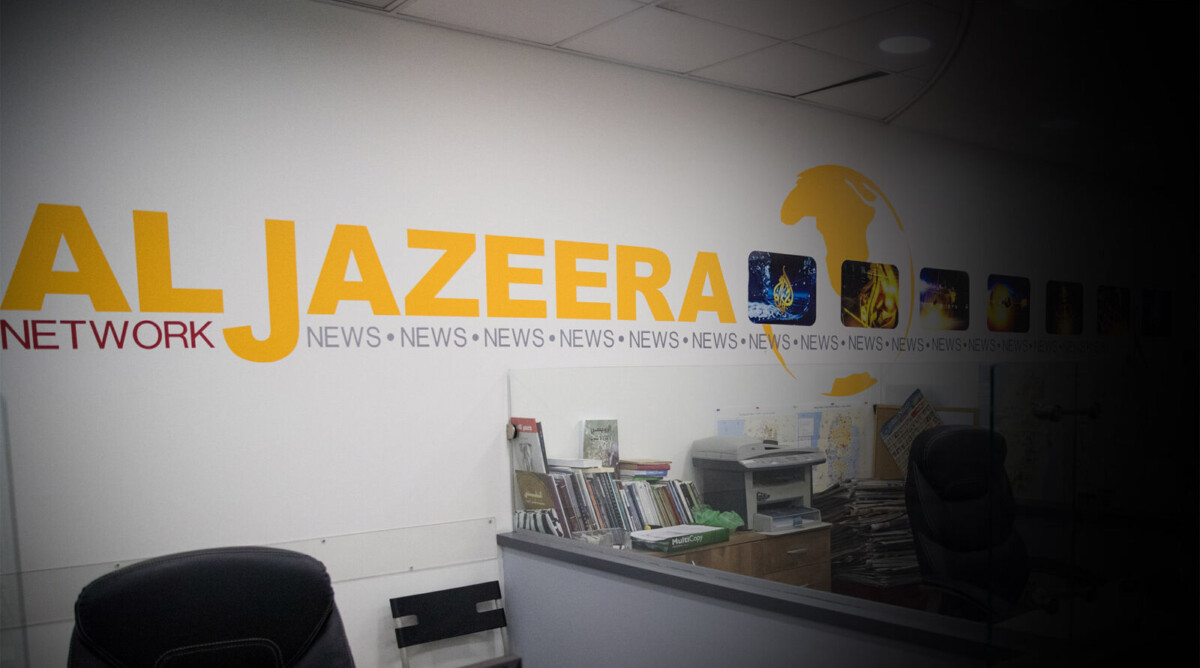The name of the Qatari-based TV network Al Jazeera has, for a long time, been invoked as a slur in Israel. Right wingers, from Twitter trolls to elected politicians, frequently hurl it at media networks that are deemed insufficiently patriotic or loyal to Israel; they — and sometimes centrists — also use it to promote their own political careers, such as when they declare that they will take some kind of action against the station.
Until now, these declarations seem to have mostly been about PR. In fact, defense officials and other government representatives have appeared on Al Jazeera on a regular basis. Now, with the massacres perpetrated by Hamas — another Qatari-funded organization — and the ensuing war, it seems that the empty talk of the past is turning into governmental action.
On Oct. 18, Avishai Grinzaig, the legal correspondent at Israeli public broadcaster Kan, reported that Attorney General Gali Baharav-Miara and Communications Minister Shlomo Karhi had reached an agreed-upon draft of emergency regulations that would allow the government to take action against Al Jazeera’s employees and its broadcasting in Israel. On Oct. 20, Karhi announced that he had brought the decision to the government for review, and that he would bring it to the cabinet for approval “after the defense minister’s consent.”
The original draft regulations Karhi proposed were extreme, granting the communications minister draconian powers, including over Israeli media. But after it was publicly revealed, a softened draft was leaked. The attorney general demanded additional amendments, mainly the transfer of authority to the defense minister and with judicial review. After a discussion in the Security Cabinet that ended inconclusively, the parties finally reached an agreement following a series of follow-up meetings.
According to the agreed-upon version, any action the Israeli government takes against the network can only be implemented following a set process. The defense minister will have to determine that the network’s activities cause “real harm to state security,” and do not just constitute broadcasting propaganda or a blow to public morale. The Security Cabinet will then have to approve the action, and only after that will the communications minister be able to issue an order to take measures against the network.
The order, according to the regulations, can include three levels of action: shutting the offices of the media network in Israel and confiscating its broadcasting equipment; removing the channel from cable and satellite platforms; and blocking access to the network’s Israeli website (with the .il suffix). The regulations do not permit the communications minister to remove social media content in a targeted manner, and the regulations are only applicable to foreign broadcasting entities, and only when the Israeli government has declared a state of war.
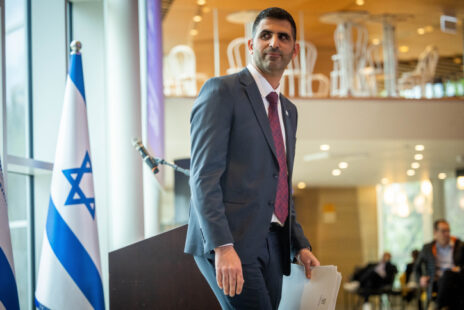
Communications Minister Shlomo Karhi speaks during a statement on his reform in the communication market, in Jerusalem, March 21, 2023. (Yonatan Sindel/Flash90)
The attorney general placed these limits because, it seems, she understood that Israelis cannot be prevented from watching network broadcasts via satellite dishes and the internet. The most effective course of action, therefore, is to simply prevent that network’s staff from operating in Israel insofar as it allegedly harms state security.
The regulations also do not prevent journalists from continuing to report provided they have a smartphone. For example, a member of the Al Jazeera team could still take video footage of a newsworthy event and transmit it to the network’s offices in London or Qatar, or anywhere they choose.
As of today, Nov. 1, the regulations have been approved by the Israeli cabinet, but the approval of the security officials to issue an order to close Al-Jazeera has not yet been given. According to a report from Ynet, the reasons for the delay are twofold: first, the Israeli government is refraining from acting so long as Qatar is involved in attempts to rescue Israeli abductees held by Hamas; and second, Israeli security officials did not actually find that Al Jazeera violated censorship rules that resulted in harm to the state’s security.
Nonetheless, the government seems set to go push ahead with the move soon. In a Knesset discussion today, Communications Minister Shlomo Karhi said that the decision to shut the network’s offices is now in the hands of Defense Minister Yoav Gallant. Karhi added, “The Prime Minister instructed that work be carried out to close the channel. We are determined to continue the process until its completion. As far as we are concerned, the orders are ready.”
‘The enemy’s narrative’
Al Jazeera, which has reported on the Israeli-Palestinian conflict since its establishment in 1996, has already had several confrontations with Israeli governments. Calls to disrupt its broadcasts often coincide with escalations between Israel and Gaza, but until now it had emerged unscathed from these episodes.
Now, however, things are different, both because of the public atmosphere following Hamas’ horrific massacres in southern Israeli communities around the Gaza Strip, and due to the Israeli security agencies’ support for shutting down Al Jazeera’s broadcasts and preventing the work of its journalists.
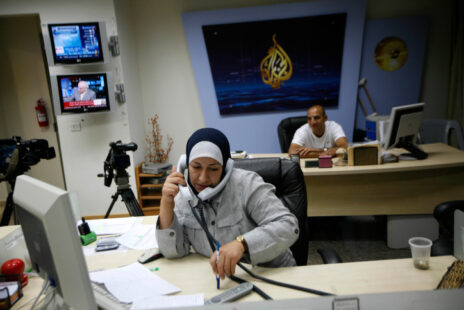
A Palestinian woman works at the Al-Jazeera TV station in the West Bank city of Ramallah. June 14, 2009. Photo by Miriam Alster/Flash90
In 2008, under the Ehud Olmert government, the Foreign Ministry, headed by Tzipi Livni, announced its intention to “boycott” Al Jazeera because of what was then called “unfair coverage” of Israeli attacks on Gaza, but the boycott never came to pass. During the 2014 Gaza war, Foreign Minister Avigdor Lieberman called for banning the network in Israel, claiming that it broadcasts “anti-Israeli incitement, lies, agitation and encouragement for terrorists.” Then-Communications Minister Gilad Erdan appealed to the chairman of the Cable and Satellite Council to discuss removing the channel from Israeli television broadcasts, claiming that they “constitute incitement.”
The most significant prior attempt to close Al Jazeera’s offices in Israel occurred in 2017. The cause, this time, was not an escalation with Gaza but efforts by various Arab governments to try and oust Al Jazeera personnel from their territory, largely due to its coverage of the 2011 revolutions and their aftermaths. Israel saw an opportunity, and then-Communications Minister Ayoub Kara solemnly announced that he had accepted Netanyahu’s request to move to shut down Al Jazeera broadcasts in Israel, and that he had begun working on the matter.
But Kara’s efforts came to nothing. The National Security Council vetoed the shuttering because, Kara claimed to The Seventh Eye, they argued that Shin Bet agents use the channel “to convey messages.” (This was, Kara said, an argument “only a naive Jew can claim.”) He was also unable to convince Israel’s Government Press Office to revoke Al Jazeera journalists’ press cards.
Now, however, things are different, both because of the public atmosphere following Hamas’ horrific massacres in southern Israeli communities around the Gaza Strip, and due to the Israeli security agencies’ support for shutting down Al Jazeera’s broadcasts and preventing the work of its journalists.
“We’re talking about a network from Qatar, a network that regularly spreads the enemy’s narrative,” Likud MK Ariel Kellner, who wrote to Karhi and Netanyahu demanding the immediate expulsion of Al Jazeera’s staff, told The Seventh Eye. “In addition, and perhaps worst of all, it uses power and freedom of the press and its press passes to endanger our soldiers and share information about their whereabouts, the locations of fallen missiles, etc. It is a hostile network, [and] we should not give them the opportunity to broadcast here in the State of Israel, not even during routine times. When we are vulnerable here, we have to be [at our] most cautious.”
‘Every government that shuts down the media loses’
In the current round, as Kellner reflected, Israeli officials are claiming that Al Jazeera is transmitting real-time information to the enemy about the locations of Israeli forces and their equipment — which is why, according to Kan, the Mossad is backing the proposal to shutter the network. This argument carries much more weight for the Israeli authorities, because — unlike supposed propaganda and incitement, which in any case cannot be successfully blocked — effective action can be taken against the alleged exposure of military maneuvers.

Israeli soldiers seen at a staging area near the Israeli border with Lebanon, northern Israel, October 30, 2023. Photo by Ayal Margolin/Flash90
Al Jazeera strongly rejects these claims. “We coordinate with the army about where our teams stand,” Walid al-Omari, director of Al Jazeera’s Israel office, told The Seventh Eye. “What we shoot, and broadcast is not even 10 percent of what is broadcast on Israeli channels on this matter. We always call the military, tell them where we are, check whether it is allowed or not, and if they say it is a closed military zone, we immediately leave.
“But it is easy to blame the media,” al-Omari added. “It always happens in the Middle East; anyone who does not achieve their goals or is defeated starts pursuing us.”
Al-Omari noted that in the 25 years Al Jazeera has been operating in Israel, the station has “never had a warning … not even a comment from the censor.” Moreover, he added, the network’s crew is stationed in the same border area [around Gaza] as other news outlets — not least because the level of Israeli incitement meant that he and his reporters feared being attacked by Israeli civilians. As such, Al-Omari said, his team’s orders “are to always be with all the teams from the whole world.” Given that Israeli civilians have already attacked Arab broadcasting crews in the south, these fears are not unfounded.
Exacerbating the accusations against Al Jazeera are Israel’s massive security debacles on Oct. 7, Al-Omari continued. “You have a government that is aware of its utter failure, and is having problems, so the easiest thing is to go after some famous TV channel like Al Jazeera and start making all kinds of accusations.” During the current war, as in previous escalations, he said, the channel continues to broadcast the press conferences of Netanyahu, Gallant, and IDF Spokesperson Daniel Hagari.
Al-Omari flatly rejected the suggestion that there might be other political considerations at play in the efforts to push Al Jazeera out of Israel. “True, we broadcast from Qatar,” he said, “but if you want to pressure Qatar, it’s not through Al Jazeera. In the end, if Al Jazeera is shut down here, it does not mean that it will stop broadcasting, just that it will continue broadcasting only from one side. It will continue broadcasting from Gaza.
“When you have an Al Jazeera office here, we need to balance somehow,” he continued. “Since 1996, there have always been Israelis interviewed on our channel. This is Al Jazeera’s strategy. Do you know how much [heat] we take from the Arab world when we bring on [Israeli] air [force] officers in their uniforms during such a war?” Israel, al-Omari added, stands to lose out if it shutters Al Jazeera. “Every government in the world that shuts down the media loses. Any government, not just Israel.”
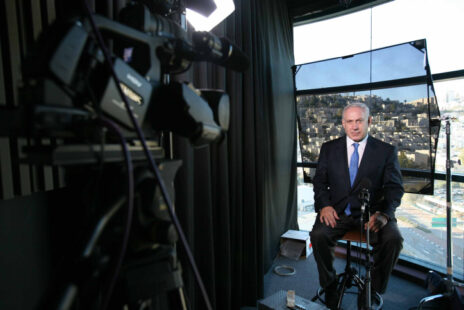
Israeli Likud party leader Benjamin Netanyahu is interview to Al Jazeera TV station in Jerusalem, January 01, 2009. Photo by Michal Fattal/Flash90.
Moreover, Al-Omari added, the network will file a petition to the Israeli High Court if the government tries to close the channel’s branch. “All of us in the Jerusalem office are Israeli citizens,” Al-Omari said. “There are about 20 employees here, who pay taxes, and everything is legally registered in Israel. When they harm our livelihood, what then? Will they support us? Will they support our families? Even the Palestinian Authority doesn’t act like that, even though we attack them day and night.”
MK Kellner, for his part, dismissed Al-Omari’s claims that Al Jazeera coordinates its activities with the IDF. He claimed that Al Jazeera journalists may be passing information to the enemy “quietly” rather than on air, but was quick to admit that he has no evidence of this. Regarding the network’s broadcasts, Kellner said, “When the entity is hostile to begin with, I think they have no place in the State of Israel. They can broadcast from Qatar or elsewhere in the world.”
‘A slippery slope’
The Association for Civil Rights in Israel (ACRI) is appealing against the regulations. Gil Gan-Mor, an attorney with ACRI, argued to the attorney general that the use of emergency regulations is unjustified, and that “the communications minister’s political briefings against the attorney general clearly indicate that there is no matter of state security at stake.
“It seems that the only reason for using the extreme tool of emergency regulations is that it is possible to do so,” Gan-Mor continued in the appeal. “The price is the lack of procedure and parliamentary oversight on a delicate matter that touches on a core issue of freedom of expression.”
Gan-Mor told The Seventh Eye that emergency regulations are “an extreme, undemocratic tool that allows the government to enact laws or expropriate laws without the Knesset, without public debate, effective immediately through a government decision.” The only situations in which emergency regulations are justified, he continued, are when there is “an urgent need for combat or for the immediate supply of goods or civilian needs related to the fighting that cannot be resolved in any other way.” The Al Jazeera proposal does not meet these benchmarks, Gan-Mor said.
Gan-Mor also disputed the claim that shutting Al Jazeera in Israel is an appropriate response to accusations that the network broadcasts Israeli soldiers’ whereabouts. “There are quite a lot of tools in the existing law that make it possible to thwart and prosecute journalists who deliver information to the enemy,” he explained. “You do not need these regulations to deal with such a thing, which is unequivocally against the law. It is not like they suddenly discovered that there is a lacuna in the law and there are no ways to deal with it.”
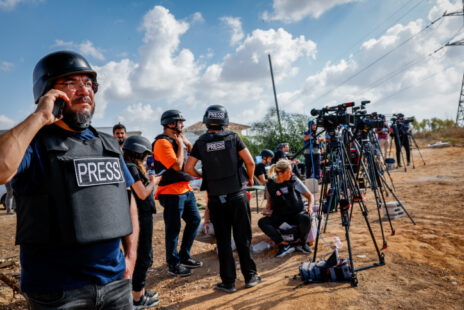
Foreign and Israeli journalists stand on a hill overlooking the Gaza Strip in the city of Sderot, southern Israel, October 19, 2023. Photo by Nati Shohat/Flash90
Gan-Mor continued: “It’s [also] important to remember that these are regulations that apply to every media network; we’re not dealing with Al Jazeera or whether Al Jazeera broke the law or not. We have no idea. We have not seen the security reports. [ACRI] does not represent Al Jazeera, we represent the importance of preserving freedom of expression.
“These are general regulations, and it is possible that after Al Jazeera there will be other channels [the government] wants to shut down. We want to make sure that we do not use the name of security in vain and do not use the state of emergency to shut down channels because of their line of coverage or for other punitive reasons. It’s a slippery slope and a very dangerous thing that cannot be accepted, not in routine times and certainly not in times of emergency.”
‘Who we want to be’
Although there are criminal and counter-terrorism laws that enable Israeli government ministers to take action against media networks, these are much more complex to enforce. For someone to be criminally prosecuted, whatever act they committed must pass a high threshold. This is not the case under emergency regulations.
Kellner, for his part, believes that such regulations “are the right direction” rather than legislation, even though he serves as a member of the Knesset. “Regulations are much more appropriate and effective, and there is no interest here in primary legislation now, to convene the Knesset in order to do something so elementary,” he said. “If necessary, we will also do it through primary legislation in order to regulate it in the long term.”
When asked whether, given that there are already legal prohibitions in place, the issue was about enforcement rather than a lack of regulations, Kellner agreed that the laws needed to be enforced, but argued that Al Jazeera specifically is in a “gray area.” “If there is a civilian here who calls the enemy and starts telling them to range [their weapons] from here or there, that’s of course espionage in wartime. It is full cooperation with the enemy and it is quite easy to put it in the rubric of the law,” he said.
“But here [Al Jazeera] ostensibly deals with ‘journalism’ and they merely ‘report’ … So as far as journalism is concerned, things need to be defined more specifically, which apparently the legislature did not think about.”
The opinions of Israeli security agencies that supported the action against Al Jazeera were not made public, but, according to media reports, they did not include evidence of allegations against the network. This is likely one of the reasons why the approval of the regulations was delayed. Whether the agencies finally presented such evidence, or the regulations were approved without it, the courts will probably demand some proof that the network indeed harms state security.
According to Dr. Roy Kibrik, the director of research at the Mitvim Institute, it is precisely concern for national security that should prevent the closure of Al Jazeera in Israel.
“I guess I understand security differently from other entities in this country,” he said. “Security includes not only physical security, but also existential security in terms of who we are, that we maintain our identity, who we want to be. I think there is a very important value in fighting for that even in times like these. We want to be a society where the media has an important role to play in reflecting what’s happening. It is extremely important to prevent an eventuality where only the government can report [on current affairs] to the public.”
This article was first published on The Seventh Eye. English translation by 972mag.com. Read it in Hebrew here









